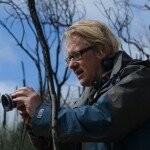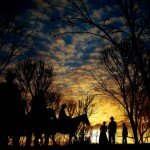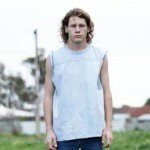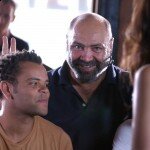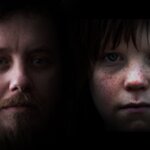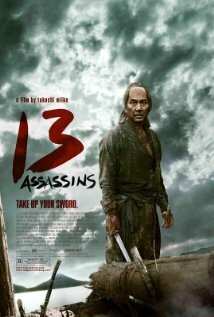Considering Kriv Stenders’ last two films, Blacktown and Boxing Day, were digitally shot low-budget dramas set in urban Australia, it’s understandable why the director admits he “wanted to work on a broader canvas.” He found his canvas in Andy Cox’s screenplay of Lucky Country, a western/thriller set in the Australian bushlands at the turn of the 20th century, which serves up a decidedly darker take of the onset of the Australian federation.
Fuelled by a strong Australian cast consisting of Aden Young (The Bet, Cosi), TV’s Neil Pigot (Neighbours, The Secret Life of Us) and introducing young prodigy Toby Wallace, Lucky Country follows a desperate family on the brink of ruin when three strangers arrive at their farm with rumours of gold. As the lure of gold infects each member of the family, their cabin becomes a psychological battleground in which their loyalty is put to the ultimate test. There’s really nothing ‘lucky’ about it; Stenders’ film is a thrilling, yet harrowing, exploration of the human condition and a worthy addition to what is shaping up to be a remarkable year of Australian films.
With Lucky Country opening nationally on July 16th, I had the opportunity to sit down with Kriv to discuss his new film and the state of the Australian film industry. He talks of his influences as a filmmaker, why he decided to shoot Lucky Country in film instead of digital and how he believes “99% of directing is casting”.
—–
CUT PRINT REVIEW: Your last two films, Boxing Day and Blacktown, where set in modern day urban Australia. In contrast, Lucky Country is a film set in the early 1900′s and out in the Australian bush. Given how different it is to your past works, what was it about Lucky Country that attracted you to it?
KRIV STENDERS: Well my last two films were primarily festival films. They were great experiences, and very successful critically. But after doing those two films I really wanted to work on a broader canvas, so I was really keen to apply what I had learnt on those films and do something a lot more ambitious. I really wanted to do a genre film and then this script came along and it was so strong. I thought it would be a great chance to apply everything I’ve learned and do something on a bigger, broader canvas.
Lucky Country is technically a period film, but I personally thought that these characters and their issues could just as easily exist today. Is Lucky Country a universal exploration of the human condition or one specifically relating to Australia post federation?
I think the great thing about this story is that it’s specific, but it’s also universal. You know? It’s specifically about this family and this farm at the year of federation, so it’s clearly that setting historically. But I think it has a lot of resonance. I think it talks about an Australia that exists now as well. A lot of the same issues in the story apply now. Ironically, the writer Andy Cox was originally going to set the story in contemporary times, but he decided by setting it in the past it would be stronger and more resonant.
I think the fact that it’s a genre film – a thriller and a western – you can be a little bit bolder with the themes.

|
Are you looking to primarily educate or entertain audiences?
I’m looking to entertain them. I really wanted to make a film for the audience I don’t want to make a didactic history lesson. It’s first and foremost a thriller; with thrills, chills, spills and shocks. If they get something out of it intellectually, then that’s great.
But it’s more so what I call a ‘Trojan Horse’ film; it presents itself as one thing, but unleashes all these other ideas.
You’ve often described Lucky Country as a psychological thriller. I definitely see some of Kubrick’s The Shining in there, especially in the development of Nat’s character. When it comes to crafting suspense in film, what films or filmmakers do you source for inspiration?
I think when you’ve grown up with a lot of films, what happens is it’s not necessarily one film that your referencing, it’s more like a reservoir of instinct. I’ve watched a lot of thrillers in my time and I was really trying to tap into that intensity and that compelling, character driven suspense. You know, where there are few very simple elements – a cabin, six characters, secrets – and how within that you can really create tension and drama, with very little.
I guess Polanski, Hitchcock and all those guys really set up some great conventions that you can return to look at. But a lot of it though is instinct; you really try and put the camera where the story is and really try and create drama and suspense out of what you’ve got.
How did you go about funding a film like Lucky Country?
In this country there are a few avenues. We basically decided we were going to make the film for a certain amount and at that point – the initiative doesn’t exist anymore as it was under the Australian Film Commission which doesn’t exist anymore, it’s now Screen Australia – they had a low budget initiative. We thought we’d apply for that. We were also able to get some money from the Adelaide Film Festival, South Australian Film Corporation and from our distributors Footprint Films.
Was it easier or more difficult to fund Lucky Country with new the Producers offset scheme [which gives Australian filmmakers 40% of their expenditures back], when compared to the former 10BA tax incentive [where investors received 100% of their money back when investing in Australian films]?
I don’t think it’s easier or harder, it’s always hard. Getting money any way is always hard! But yeah, we got the producers rebate. I think the rebate is better in a way because it’s your equity that you get back. So for producers I think it’s a lot more empowering.
What do you do in terms of research to faithfully reconstruct Australia in 1902?
We did a lot of the usual research; we went to the housing trust, went to museums and approached a lot of historical societies. We looked at lots of pictures and watched a lot of films as well. So it was a real combination of things. But we were also trying to choose and create our own world as well.
Did the actors have to undergo any voice training?
Yeah we got a voice coach in to teach the kids to speak in that more clipped tone. Toby Wallace is originally British, so he already had a natural accent. So it was just refining it so all of them had the same accent, and we got a speech coach in to help us with that.

|
Screenwriter Andy Cox has described the Australian landscape as “one of most inhospitable terrains on earth”. You had to film on such a location, what challenges did this present?
The biggest challenge was that it was very wet and very cold! What’s great about that – what we wanted was that the landscape to become a character and also inform the story. In a funny kind of way, when it’s hard to shoot something, it actually makes it look better on screen because you’re working harder to achieve a certain level or certain quality. So in a way, the challenges were good ones because they ended up on the screen.
But we filmed in Clarendon, in a place called Mt Bold. It’s only about forty minutes north of Adelaide.
Aden Young delivers such an intense performance as Nat, how did you go about developing his character?
Well his character was pretty well drawn in script. He was pretty outline and pretty developed. For me, 99% of directing is casting. So if you can cast the film right and cast the right actor for the character then it kind of works itself out. Although preproduction was very fast on this film. We cast it fairly quickly; It was only about about a month.
But I think Aden was really right for the role. He understood the character and he bought a lot of his own thoughts and interpretations to the character, which is how a like working. I really like the actors to own their characters. But Aden is fantastic, he’s great. I mean, he’s done 20 films so he’s got a lot of experience.
How did you come across Toby Wallace when casting the character Tom?
Well we looked at a lot of kids, and it’s really hard looking for kids now because a lot of them look so 21st century. So we were trying to find someone that could play an early 20th century kid. Toby had that kind of quality about him; he had an ‘old soul’ to him. He’s also just incredible; he has an incredible presence on screen. He was just excellent.
The film is quite dark and graphic at times; as a director, is it ever a concern working with a child actor that you are exposing them to such themes?
Well film sets are actually really boring places. I mean, when you’re making a film it’s all done it little pieces. So the impact of those scenes isn’t really there on the day. And you know, he’s a thirteen year old kid, so he’s got a fair amount of knowledge about the world and about things. We talked to him about it and also made sure his mother was aware of it and everything was ok. It was just being responsible; make sure everything is above board and don’t try and exploit the situation.

|
Lucky Country was shot in 16mm, but your last two films were Digital. Why did you make the switch?
We decided to use film for a number of reasons. When we did the numbers, we worked out that is was going to be just as expensive to shoot on digital, or at least the digital format we wanted to. Also, the fact that we were going to be shooting in very diverse conditions and extreme locations. Digital cameras are great when you’re shooting an urban, modern story. But we just didn’t have room to have any failure; we really couldn’t afford to have a camera go down on us.
Also the look; with the sun, the light was obviously constantly changing, so we thought that film would be a lot more reliable.
Having now worked extensively with both digital and film, what do you prefer?
Well for certain kinds of film, the last two films I’ve made, digital was perfect because we shot a lot of long takes and improvisations so you don’t have that tyranny of film stock. So it’s a lot more malleable and a lot more flexible format. But because this was a traditional story, you know, with scenes we could be a lot more precise about the coverage. So we didn’t have to shoot digital.
I personally think film has a more cinematic quality, especially with period films…
Yeah, exactly. That was the final thing; call me old fashioned, but I still think the period films have got to be shot on film.
There have been so many great Australian films coming out of Australia this year, far more than previous years. What do you think is in the water?
Yeah it’s interesting. I mean, I think it’s been a tough couple of years and I think you just do have some strong years. I also think that the film industry is in a really good state right now. I think people are really beginning to realise what Australian films can be and I think there’s just a lot of good filmmakers now who are maturing and getting stronger. People like Warwick Thornton (Samson and Delilah) and Sarah Watt (My Year Without Sex) they’re not first timers. Even though Samson and Delilah is Warwick first film, he’s an experience filmmaker. So I think it’s a combination of things; it’s been a case of really great filmmakers being given the chance.
In terms of the themes being explored by Australian filmmakers, it’s not exactly the most uplifting of film Industries. It’s interesting that there have been a lot of dark films to come out lately…
Yeah I know what you mean. I don’t think it’s a good thing all our films are dark! It would be great if there was a variety and a different scope. But I think in terms of Lucky Country, it’s a thriller and it’s looking at the landscape and it’s looking at the Australian history, in terms of its brutality. It’s a brutal place, and it still is in a strange sort of way. Australia is a scary place!
You’ve done a modern drama and now a period thriller. What do you want to do next?
A family movie! I want to do something joyful and life… enhancing. (laughs)
(laughs) So ‘the darkness’ does start to rub off on you?
Yeah, seriously it does. I’m really sick of dark films! I can’t wait to do something really light.
I mean, you make films for an audience and you want to really deliver to the audience and give them a great experience. I’m very proud of Lucky Country, because I think it does do that. I think audiences really respond to it. But at the same time, I’d love to do something that wasn’t dark and took audiences somewhere else emotionally. I’ve got a lot of stories that I want to tell, and I want to challenge myself in many different areas.
Do you still write screenplays yourself?
Yeah, I write, but the last couple films I haven’t. Obviously, Lucky country I haven’t written and I’m working on a film now I haven’t written…
What film would that be?
Well I don’t know if it’s going to get financed yet, but it’s called Red Dog. So it’s a dog movie. It’s based on a book by Louis De Bernieres who wrote Captain Corelli’s Mandolin. He’s an English writer and it’s a collection of short stories about this dog.
Do you have any desire to make a film that’s not distinctly Australian?
Yeah I’d love to make all sorts films. I’d love to work in America and at least have that experience once. I’ve got some stories that – I think it’s interesting that, as Australians, we really don’t make many films that look at the world outside of Australia. That’s what great about [Robert Connolly's] Balibo in that it’s an Asian story. I’m really fascinated by Asian stories as it just seems like such a logical fit to do Australian films set in Asia. So I’d really like to try and make a film in Asia.
On behalf of the aspiring filmmakers out there, do you have any advice for them that you wish you were taught early on in your career?
Oh, that’s a really good question. (pause)
Two things. It sounds basic, but the importance of story. Like, really being given a stronger awareness of storytelling techniques. When you’re making a film – be it short film, documentary or feature -it’s all about locking into something that’s going to engage an audience.
The other one is don’t question your instincts. Being encouraged to trust your instincts. Go with your first gut feelings and things.
Thank you for your time Kriv and best of luck with the film!
Thank you!
—-
Lucky Country opens nationally July 16th, 2009.
 Follow the author Anders Wotzke on Twitter.
Follow the author Anders Wotzke on Twitter.

